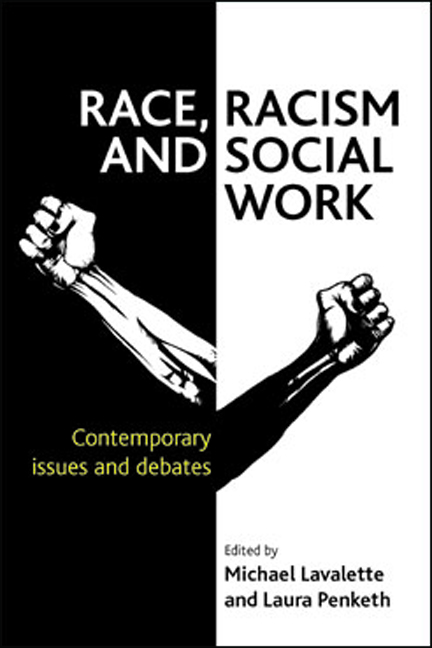Book contents
- Frontmatter
- Contents
- Notes on contributors
- Acknowledgements
- Dedication
- Some terms and definitions
- Introduction: Race, racism and social work
- one Rethinking anti-racist social work in a neoliberal age
- two The growth of xeno-racism and Islamophobia in Britain
- three The catalysers: ‘black’ professionals and the anti-racist movement
- four “Same, same, but different”
- five Antisemitism and anti-racist social work
- six Anti-Roma racism in Europe: past and recent perspectives
- seven In defence of multiculturalism?
- eight Social work and Islamophobia: identity formation among second and third generation Muslim women in north-west England
- nine Institutionalised Islamophobia and the ‘Prevent’ agenda: ‘winning hearts and minds’ or welfare as surveillance and control?
- ten ‘Street-grooming’, sexual abuse and Islamophobia: an anatomy of the Rochdale abuse scandal
- eleven My people?
- twelve Twenty-first century eugenics? A case study about the Merton Test
- thirteen The role of immigration policies in the exploitation of migrant care workers: an ethnographic exploration
- Conclusion: Race, racism and social work today: some concluding thoughts
- Bibliography
- Index
ten - ‘Street-grooming’, sexual abuse and Islamophobia: an anatomy of the Rochdale abuse scandal
Published online by Cambridge University Press: 01 February 2022
- Frontmatter
- Contents
- Notes on contributors
- Acknowledgements
- Dedication
- Some terms and definitions
- Introduction: Race, racism and social work
- one Rethinking anti-racist social work in a neoliberal age
- two The growth of xeno-racism and Islamophobia in Britain
- three The catalysers: ‘black’ professionals and the anti-racist movement
- four “Same, same, but different”
- five Antisemitism and anti-racist social work
- six Anti-Roma racism in Europe: past and recent perspectives
- seven In defence of multiculturalism?
- eight Social work and Islamophobia: identity formation among second and third generation Muslim women in north-west England
- nine Institutionalised Islamophobia and the ‘Prevent’ agenda: ‘winning hearts and minds’ or welfare as surveillance and control?
- ten ‘Street-grooming’, sexual abuse and Islamophobia: an anatomy of the Rochdale abuse scandal
- eleven My people?
- twelve Twenty-first century eugenics? A case study about the Merton Test
- thirteen The role of immigration policies in the exploitation of migrant care workers: an ethnographic exploration
- Conclusion: Race, racism and social work today: some concluding thoughts
- Bibliography
- Index
Summary
In this chapter Orr looks at the recent cases of ‘street-grooming’. The purpose, primarily, is not to look at the complexities of child abuse (though, of course, this is touched upon) but the way this has become a ‘moral panic’ that has focused on the ‘alien’ culture of Pakistani Muslim men and their attitudes towards women and children in general and white women and children in particular. Recently Guardian columnist Joseph Harker (2013) ran a column called ‘Time to face up to abuse in the white community’ in which he reviewed the Jimmy Saville, Stuart Hall and north Wales children's home scandals and asked ‘what is it about white people that makes them do this?’ and he goes on to ask ‘Is it white people's culture? Or maybe it's their religion?’ His questions, of course, are sarcastic. However, they are there as a direct challenge to the politicians and media pundits who used the small number of cases where Muslim men were involved in abusing young girls as ‘evidence’ of the incompatibility of Muslim and Western cultures. Orr's case is that the ‘grooming scandals’ are an example of a racially induced moral panic. For social work students, educators and practitioners being able to unpick such ‘moral panics’ is vital if we are to intervene effectively and appropriately.
Introduction
Towards the end of 2012 British society was rocked by revelations from a series of sex-abuse scandals. First, the former Radio One disc jockey Jimmy Saville was revealed as a serial sex-abuser of young women in a shocking story that implicated a range of high-profile individuals and institutions in British society – from the BBC to the prison and hospital services. Then in a second set of revelations, a series of establishment figures were implicated in a terrible story about the abuse of young people in a north Wales children's home in the 1970s and 1980s. In both cases the abusers were linked to powerful elites in British society – and in both cases there was a backlash against the accusations.
- Type
- Chapter
- Information
- Race, Racism and Social WorkContemporary Issues and Debates, pp. 191 - 204Publisher: Bristol University PressPrint publication year: 2013



